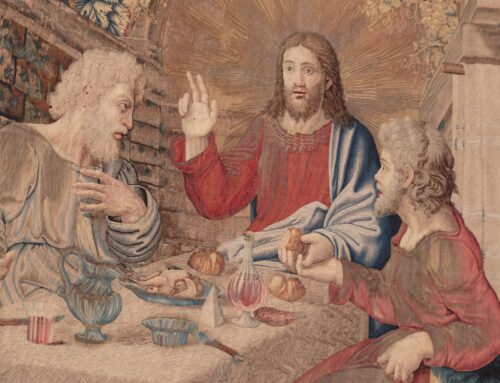The day we use to commemorate the life of St. Valentine has become all about love. Luke 10:25-37 records a conversation with Jesus in which the subject of love came up. Those who were experts in the Jewish law given to Moses, along with all the little rules and loopholes added to God’s law, always seemed to be showing up and asking Jesus questions. It wasn’t because they hungered for the truth He had to offer. It was because they were jealous of Him and hoped to trip Him up in some way. But they were no match for the Son of God. They were never successful in foiling Him.
HOW TO INHERIT ETERNAL LIFE
On this occasion recounted in Luke 10, verse 25 says that “an expert in the law stood up to test Jesus.” He asked Jesus what he would have to do “to inherit eternal life.” Perhaps he had heard of the Jewish ruler Nicodemus’ secret encounter with Jesus by night and his subsequent faith in Jesus, yet didn’t want to believe. (See John 3:1-21; John 7:50-51; John 19:39). Jesus bounced the question back to the law expert, asking his interpretation of the answer, based on his knowledge of the law.
 Matthew 22:34-39 and Mark 12:28-31 record an episode wherein an expert in the law asked Jesus which is the greatest commandment. The law expert mentioned in Luke 10 gave an answer to his own question about how to receive eternal life that was equivalent to Jesus’ answer to the question of which was the greatest commandment. The response of the man in Luke 10 indicated that in order to inherit eternal life it would be necessary to “ ‘Love the Lord your God with all your heart and with all your soul and with all your strength and with all your mind’ and ‘Love your neighbor as yourself.’” Both of those commandments can be found in the Old Testament—the first one, about loving God, in Deuteronomy 6:5 and the second one, about loving your neighbor, in Leviticus 19:18. I wondered whether the man in Luke 10 had heard Jesus’ answer about the greatest commandment earlier.
Matthew 22:34-39 and Mark 12:28-31 record an episode wherein an expert in the law asked Jesus which is the greatest commandment. The law expert mentioned in Luke 10 gave an answer to his own question about how to receive eternal life that was equivalent to Jesus’ answer to the question of which was the greatest commandment. The response of the man in Luke 10 indicated that in order to inherit eternal life it would be necessary to “ ‘Love the Lord your God with all your heart and with all your soul and with all your strength and with all your mind’ and ‘Love your neighbor as yourself.’” Both of those commandments can be found in the Old Testament—the first one, about loving God, in Deuteronomy 6:5 and the second one, about loving your neighbor, in Leviticus 19:18. I wondered whether the man in Luke 10 had heard Jesus’ answer about the greatest commandment earlier.
These two commandments about love summarize the Ten Commandments we find recorded in Exodus 20. Loving God “with everything you’ve got” sums up the first four commandments—having no other gods, making no idols, respecting God’s name, and using one day of the week to honor God. Loving your neighbor as yourself encompasses the last six commandments—honoring your parents, not committing murder, staying away from adultery, refusing to steal, being truthful, and not desiring to have whatever your neighbor possesses. In Matthew 22:40 we find that Jesus said, “All the Law and the Prophets hang on these two commandments.”
Jesus basically responded to the Luke 10 “expert’s” answer by saying, “Exactly. If you do that, you will have eternal life.” But I thought, “Wait a minute! I thought we gain eternal life by being born again on the basis of our faith, as Jesus had told Nicodemus in their secret meeting by night.” Then I realized that Jesus must have been saying that if you keep the law perfectly, you can earn your way into Heaven. However, since no one can keep the law perfectly, that leads us right up to our need for God’s grace through faith. That man would need Jesus, who would soon give His life to pay for our sins on the cross, to be his Savior.
Reading on, verse 29 of Luke 10 says, “But he wanted to justify himself, so he asked Jesus, ‘And who is my neighbor?’” Was he hoping his neighbor would be defined as the guy next door to him? Perhaps he thought that if he were only required to be good to the guy next door, he could handle that. But Jesus’ answer greatly broadened the definition of “neighbor.” (Maybe this is where Mr. Rogers got the idea for his “Won’t you be my neighbor?” theme song.)
Chances are, you have read or heard more than once the story Jesus told to illustrate the parameters of the identity of “your neighbor.” It’s the well known story of “The Good Samaritan.” I decided to imagine a story in our modern-day setting that might help us relate that ancient story to our modern lives. Perhaps we could identify with it a little more. After writing the story, I wondered whether I would respond the way “Kathleen” did. Would I write “Lena” off because she could be a scammer or she should have planned better? Would I be that generous? Below is my modern version of the story.
A MODERN-DAY GOOD SAMARITAN
Lena pushed her rolling suitcase down the sidewalk as she made her way from the train station in Ashtonville to the nearby Ashtonville bus station, where she would catch the bus to her son’s home some 300 miles northeast of Ashtonville. She had worked hard at her housecleaning job to earn this little trip, and she so looked forward to seeing her son and daughter-in-law and her adorable 3-year-old grandson.
She was not prepared for what would happen in the next moment. She felt a tug on the purse on her shoulder and spied the point of a knife out of the corner of her eye. “Just hand over your money and I’ll leave you alone,” the voice of a young man blurted.
“But I need my money to take the bus,” Lena protested. “Hand it over, or you’ll be sorry,” the voice insisted. Shaking and with tears streaming down her face, Lena complied. She was glad she didn’t have a credit card. She emptied her wallet and handed over her cash. The young man grabbed the cash so roughly that he knocked the shaken woman to the ground.
Lena was thankful it seemed she had no serious injuries. She had a scraped elbow, and maybe she would have a few bruises. She slowly pulled herself up, pulled her suitcase to a bench a few feet away, and sat down to regain her composure and collect her thoughts. She wished someone had been around to discourage the young man from trying such an atrocious thing. What would she do now? What would she tell her son? He’d be so worried. Forty-five minutes passed while she sat there and tried to think what she should do.
Another train had arrived. A couple of people came out of the train station and headed toward the sidewalk where Lena was seated. She assumed they were on their way to the parking lot to pick up their cars. A man with a clerical collar rolled his suitcase by quickly. He gave her a casual smile and a nod, then glanced at his watch. He didn’t seem to even wonder why her hair was disheveled and her elbow was scraped and her eyes were wet with tears. Then a young woman, who was wearing a T-shirt that read “I Am a Child of God” and a back-pack, walked slowly past. She was too busy texting someone to even notice Lena.
A middle-aged woman clad in a professional-looking pantsuit exited the train station. She stopped momentarily to check her phone. Then she shoved the phone back in her handbag, grabbed the handle of her suitcase, and was headed down the sidewalk toward Lena. The woman saw Lena from a distance and began walking more briskly toward her. She bent down and looked into Lena’s eyes. “Are you alright?” she asked. “What happened?”
Lena recounted her story. She told the woman, who had introduced herself as Kathleen, what had happened. She told her she had no money now for her bus ticket, and she had probably missed the departure of the bus anyway. There was little time between the train arrival and bus departure.
“Look,” said Kathleen, “I had an appointment scheduled for an hour from now, but I can postpone it. There’s a small hotel just around the corner. They have a little café inside. I’ll pay for a night’s lodging and give you enough money for a lunch, a dinner, and a breakfast—and a bus ticket. Let me walk you to the hotel.” Tears again filled Lena’s eyes. How could anyone who didn’t even know her care so much?
After Kathleen paid for a room with her credit card, she handed Lena money for food and the amount she said she needed for a bus ticket. “Please,” said Lena, “give me your address so I can pay you back as soon as I save up some more money.”
“Not on your life,” Kathleen replied with a wink. “You just save up money for your next trip. I’m so sorry someone did this to you.” As Kathleen prepared to leave, Lena asked, “How can I ever thank you?” Before the two parted, they shared a long hug.
There’s an old hymn entitled “Make Me a Blessing.” I found a Youtube video wherein that hymn was sung by a girl named Sofia Tsatalbasidis. (I’m glad I’m only writing her name, rather than pronouncing it.) Apparently she performed it in 2009. Sofia had an amazing voice for one so young. According to an article on a website for Southwest Adventist University, Sofia was a Senior biochemistry major at the university when the article was written in February of 2018, as well as being in their music program. She considers music to be partially a science. Listen to the words of the song. I think it would be well for us to pray every morning, “Lord, make me a blessing to someone today.”
Videos suggested at the end of this video are not necessarily endorsed by this website.
Scriptures taken from the Holy Bible, New International Version®, NIV®. Copyright © 1973, 1978, 1984, 2011 by Biblica, Inc. TM Used by permission of Zondervan. All rights reserved worldwide. www.zondervan.com The “NIV” and “New International Version” are trademarks registered in the United States Patent and Trademark Office by Biblica, Inc.TM






Leave A Comment